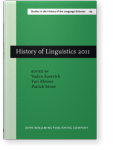Anti-positivism in early Soviet linguistics
A Marxist or idealist stance?
Soviet linguistics of the 1920s–1930s has often been presented, in the Soviet Union as well as in the so-called “Western world”, as a quest for a Marxist science of language. As a matter of fact, it would be more accurate to speak of an original blend of German romanticism, Neo-Platonistic tradition and new “social” theories of language in order to characterize the various linguistic trends of Soviet linguistics in the inter-war period. What was at stake was the question of Positivism. R. Jakobson, as well as V. Vološinov refused “mechanical causality”, the former quoting J. de Maistre, the latter – K. Vossler. It appears that the German-Italian idealist trend of thought is a better explanation for the Soviet linguistics of the inter-war period than Marxism.
